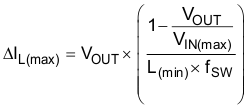ZHCSB86E November 2011 – October 2021 TPS62150 , TPS62150A , TPS62151 , TPS62152 , TPS62153
PRODUCTION DATA
- 1 特性
- 2 应用
- 3 说明
- 4 Revision History
- 5 Device Comparison Table
- 6 Pin Configuration and Functions
- 7 Specifications
- 8 Detailed Description
- 9 Application and Implementation
- 10Power Supply Recommendations
- 11Layout
- 12Device and Documentation Support
- 13Mechanical, Packaging, and Orderable Information
9.2.2.2.1 Inductor Selection
The inductor selection is affected by several effects like inductor ripple current, output ripple voltage, PWM-to-PSM transition point, and efficiency. In addition, the inductor selected must be rated for appropriate saturation current and dc resistance (DCR). Equation 7 and Equation 8 calculate the maximum inductor current under static load conditions.


where
- IL(max) is the maximum inductor current
- ΔIL is the peak-to-peak inductor ripple current
- L(min) is the minimum effective inductor value
- fSW is the actual PWM switching frequency
Calculating the maximum inductor current using the actual operating conditions gives the minimum required saturation current of the inductor. An added margin of about 20% is recommended. A larger inductor value is also useful to get lower ripple current, but increases the transient response time and size as well. The following inductors have been used with the TPS6215x device and are recommended for use:
| TYPE | INDUCTANCE [μH] | SATURATION CURRENT [A](1) | DIMENSIONS [L × W× H, mm | MANUFACTURER(2) |
|---|---|---|---|---|
| XFL4020-222ME_ | 2.2 μH, ±20% | 3.5 | 4 × 4 × 2.1 | Coilcraft |
| XFL3012-222MEC | 2.2 μH, ±20% | 1.6 | 3 × 3 × 1.2 | Coilcraft |
| XFL3012-332MEC | 2.2 μH, ±20% | 1.4 | 3 × 3 × 1.2 | Coilcraft |
| VLS252012T-2R2M1R3 | 2.2 μH, ±20% | 1.3 | 2.5 × 2 × 1.2 | TDK |
| LPS3015-332 | 2.2 μH, ±20% | 1.4 | 3 × 3 × 1.4 | Coilcraft |
| 744025003 | 2.2 μH, ±20% | 1.5 | 2.8 × 2.8 × 2.8 | Wuerth |
| PSI25201B-2R2MS | 2.2 μH, ±20% | 1.3 | 2 × 2.5 × 1.2 | Cyntec |
| NR3015T-2R2M | 2.2 μH, ±20% | 1.5 | 3 × 3 × 1.5 | Taiyo Yuden |

Using Equation 9, this current level can be adjusted by changing the inductor value.